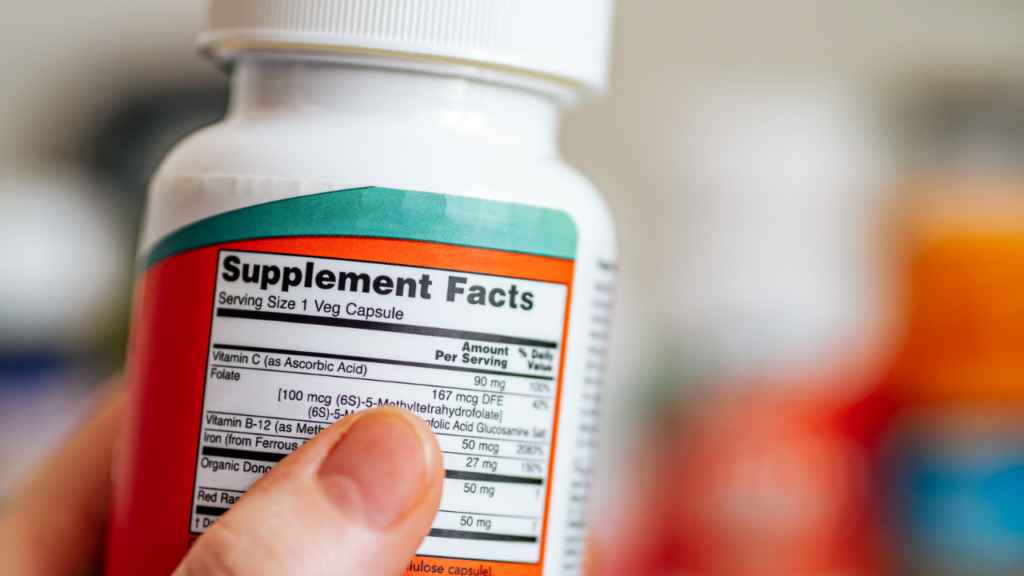Whether you’re preparing for or have undergone weight loss surgery, you’re likely wondering what are the best vitamins to take after bariatric surgery.
While everyone has a different health history, there are specific vitamins and minerals that are required after bariatric surgery.
As a Registered Dietitian, I encourage a “food first” philosophy for obtaining all the nutrients needed for optimal health. However, that’s not always possible after bariatric and metabolic surgery.
Why do you need supplements after bariatric surgery?
Supplements are a fundamental part of any post-surgery nutrition plan. They help restore and maintain nutritional balance so that your body gets all the essential vitamins and minerals it needs.
It’s important to test for vitamin and mineral deficiencies before and after surgery. For example, pre-operative deficiency rates for iron range from 8 to 45 percent for gastric sleeve patients, and pre-op vitamin D deficiency is as high as 100 percent for all bariatric surgeries.
In addition, the risk for nutrient deficiencies increases the further out from surgery you are.
After bariatric surgery, the likelihood of developing vitamin and mineral deficiencies increases for several reasons, including:
- Reduced food intake
- Less food variety and potential for food intolerances/aversions
- Reduced stomach acid secretion means less breakdown of vital nutrients, notably vitamin B12 and iron
- Decreased absorption and exposure to intestinal surface area (as with gastric bypass & duodenal switch surgeries)
For best results, correct known nutrient deficiencies before surgery, take your vitamins consistently, and keep up with annual lab testing with your surgical clinic or primary care provider.
What is the best type of vitamin to take after bariatric surgery?
Bariatric vitamins come in many forms – chewables, capsules, tablets, liquids, gummies, patches, etc. Some types of vitamins are better digested and absorbed than others.
Over time, your post-op vitamin routine will evolve based on lab results, personal preferences, and what you can comfortably tolerate after surgery. Here are a few things to keep in mind.
Chewable bariatric vitamins
Most surgical clinics recommend starting with a chewable bariatric multivitamin around one to two weeks post-op. Because the stomach’s capacity to breakdown and absorb nutrients is decreased after surgery, a chewable bariatric multivitamin with iron helps meet your needs without a ton of effort from the stomach.
It’s important to consider that a Flintstones chewable will not meet your daily vitamin needs even though many clinics suggest otherwise.
To simplify your post-op nutrition routine, I recommend choosing a high-quality, all-in-one bariatric vitamin like the ProCare Health once-daily chewable.
To prevent nausea that can follow vitamin ingestion, take with or immediately following a meal.
Bariatric vitamin patches
Vitamin patches have become increasingly popular, however, there is limited evidence on how they perform for nutrient delivery after bariatric surgery.
Some micronutrients, for instance, cannot pass through the skin, and because bariatric patients need certain nutrients in higher quantities, vitamin patches after bariatric surgery are not efficient enough to meet the needs of most post-op patients.
If you struggle with swallowing pills or feel overwhelmed with your vitamin routine, a once-daily bariatric chewable or capsule will meet your baseline needs.
Liquid bariatric vitamins
It can be difficult to find a liquid bariatric multivitamin that contains all the recommended vitamins and minerals (below).
Moreover, the taste of liquid vitamins can be quite unappealing, and to compensate, liquid vitamins may contain added sweeteners or sugar alcohols which can cause digestive discomfort.
Lastly, liquid multivitamins can be very costly. Before purchasing a liquid vitamin, try a chewable bariatric multivitamin that will meet your needs without the added cost or awful taste.

What to look for in a bariatric multivitamin
One advantage of choosing a bariatric-specific multivitamin is that it reduces the burden of taking several pills and simplifies your vitamin regimen.
Bariatric vitamins vs regular vitamins
Compared to a standard multivitamin, bariatric multivitamins include extra vitamins and minerals needed after weight loss surgery.
Currently, there are specific recommendations for 11 vitamins and minerals after bariatric surgery. The recommendations below are maintenance doses and do not factor in corrections for nutrient deficiencies.
If lab testing shows vitamin or mineral deficiencies before or after surgery, it’s important to work closely with your surgical team to correct and monitor any abnormalities.
Assuming no nutrient deficiencies, daily maintenance recommendations for gastric sleeve & gastric bypass patients include the following:
- CALCIUM – 1,200–1,500 mg
- COPPER – 1 mg (SG); 2 mg (GB)
- FOLATE – 400–800 mcg
- IRON – At least 45-60 mg
- THIAMIN – At least 12 mg
- VITAMIN A – 5,000–10,000 IU
- VITAMIN B12 – 350–500 mcg
- VITAMIN D – At least 3,000 IU
- VITAMIN E – 15 mg
- VITAMIN K – 90-120 mcg
- ZINC – 8–22 mg
The once-daily ProCare multivitamins contain all but one nutrient (calcium) in the correct dose.
Prior to calcium supplementation, it’s important to optimize vitamin D status. As previously mentioned, vitamin D deficiency is extremely common in pre-surgical candidates, so be sure that your vitamin D is within normal range to help aid calcium absorption.
Furthermore, most people who consume dairy products and fortified protein products like whey-based protein shakes, bars, or powders can meet calcium needs through diet alone. I recommend estimating your calcium intake with a food tracking app like Baritastic before opting for calcium supplements.
Third-party certifications
Nutrition supplements including bariatric vitamins are not regulated by the FDA. To ensure you are getting what you pay for, look for third-party certified nutrition supplements.

Common third-party reviewers include USP, Consumer Lab, and NSF. You can typically find these third-party stamps of approval on the front label.
As a Bariatric Dietitian, I’m very particular about which companies I partner with (especially with supplements), and ProCare Health is a brand I trust. ProCare is third-party tested by Consumer Labs, and they also test each batch of vitamins for potency and publish the reports on their website.
ProCare Health is the only bariatric supplement provider I recommend for my clients. Try them for yourself and use code ‘LIFE’ for 10% off your order!
Bariatric supplements FAQs
Why no gummy vitamins after bariatric surgery?
Multivitamin gummies contain added sugar and carbohydrate fillers, so they are not the best type of vitamin to take after bariatric surgery.
On top of this, some gummy vitamins do not contain vital minerals like iron due to flavor quality. For best results, opt for a “chalky” chewable bariatric multivitamin over gummy versions.
When is the best time to take my bariatric multivitamin?
Since bariatric surgery involves reducing the size of your stomach, it’s essential that any supplements you take are absorbed properly and efficiently.
Taking a bariatric multivitamin with food helps ensure that nutrients are more likely to be digested and absorbed by your body, giving you the most benefit. And, if you take a standalone vitamin D supplement, be sure to pair it with a meal for max absorption.
Fat-soluble vitamins like vitamins A, D, E and K need a little bit of fat for optimal absorption, so including a healthy fat source like those listed in my dietitian-approved grocery list helps you get the most bang for your buck.
Should I take biotin for hair loss after bariatric surgery?
Hair loss after bariatric surgery is a symptom of drastic weight loss and stress from surgery. Many women experience hair loss for up to six months, starting around three months post-op.
To minimize hair loss after bariatric surgery, aim for at least 75 grams of protein per day and take a daily bariatric multivitamin with iron and zinc, as some studies show a correlation between low iron and zinc to post-operative hair loss.
While hair loss and brittle nails are symptoms of biotin deficiency, taking biotin supplements for hair, skin, and nail growth is not well-supported in research. Save your money on shampoos as they have little to no effect on hair regrowth.
Hair loss after surgery is common and usually resolves on its own. If you experience hair loss after bariatric surgery for more than six months, contact your surgical clinics to asses for vitamin and mineral deficiencies.
When can you take regular vitamins after bariatric surgery?
Many surgical clinics recommend a chewable multivitamin for the first 3 to 6 months post-op. Data to reinforce this recommendation lacks supporting solid evidence. It’s best to take the recommended dose in the form that feels most comfortable to you.
I generally recommend taking a chewable bariatric multivitamin for at least 4-8 weeks post-op. After that, if you prefer to take a capsule or multivitamin tablet and are able to tolerate it without discomfort, do what feels best to you.
Summary
Finding the right type and dosage of vitamins after bariatric surgery can feel overwhelming, but it doesn’t have to be! What’s most important is that you find a bariatric vitamin routine that you can be consistent with.
Along with a healthy diet, a high-quality, third-party-certified bariatric multivitamin will cover most of your nutritional needs after surgery. For best results, take it with a meal.
Comment below with your bariatric supplement questions or send me a message!
Yours truly,
Helping women after bariatric surgery lose weight without eating “perfect.” Learn how to balance blood sugar & optimize your “tool” today! Apply to learn more!
This post may contain affiliate links. When you make a purchase through any of the links, there is no additional cost to you, and I may earn a small (and very appreciated) commission. Thank you for your support!




